Unit 1 My Day同步教学课件(共77张PPT)
文档属性
| 名称 | Unit 1 My Day同步教学课件(共77张PPT) | 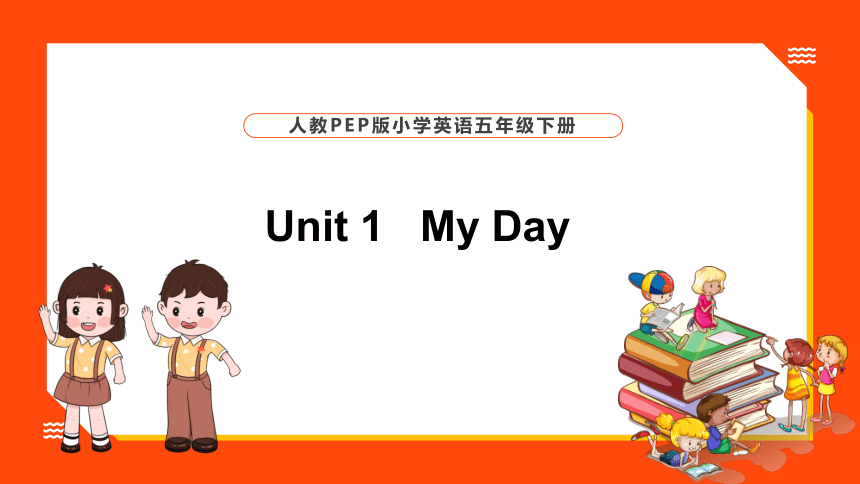 | |
| 格式 | zip | ||
| 文件大小 | 91.2MB | ||
| 资源类型 | 试卷 | ||
| 版本资源 | 人教版(PEP) | ||
| 科目 | 英语 | ||
| 更新时间 | 2023-01-29 09:27:36 | ||
图片预览





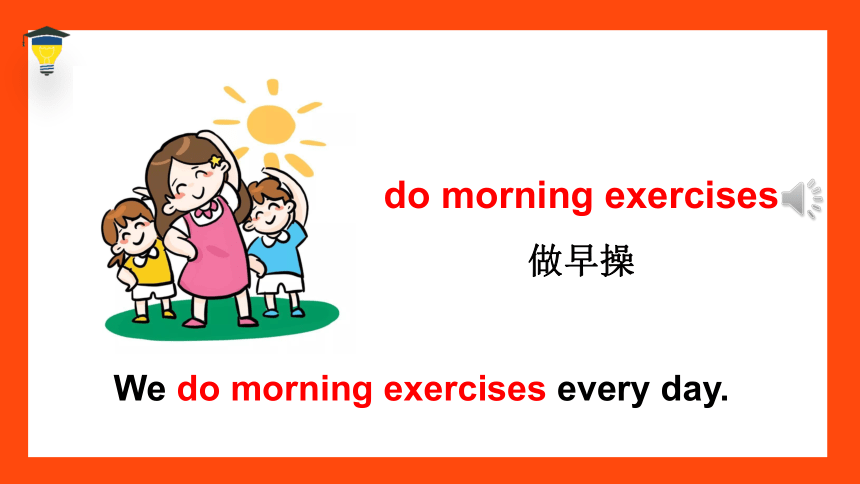

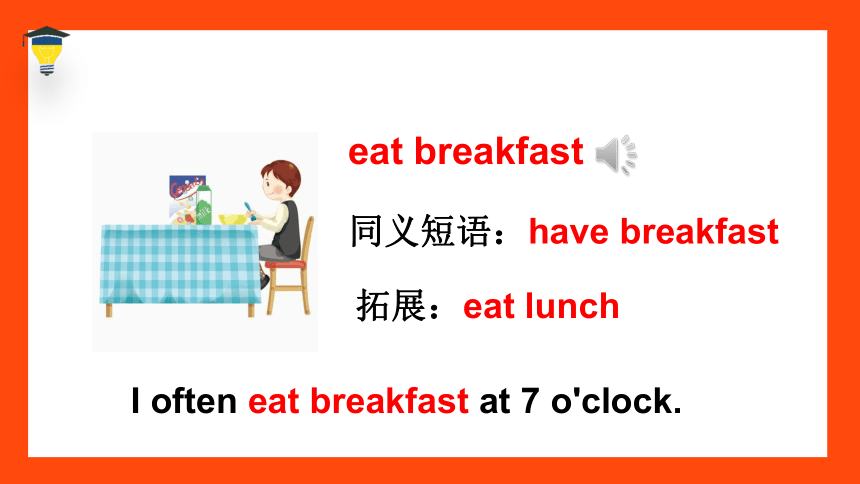
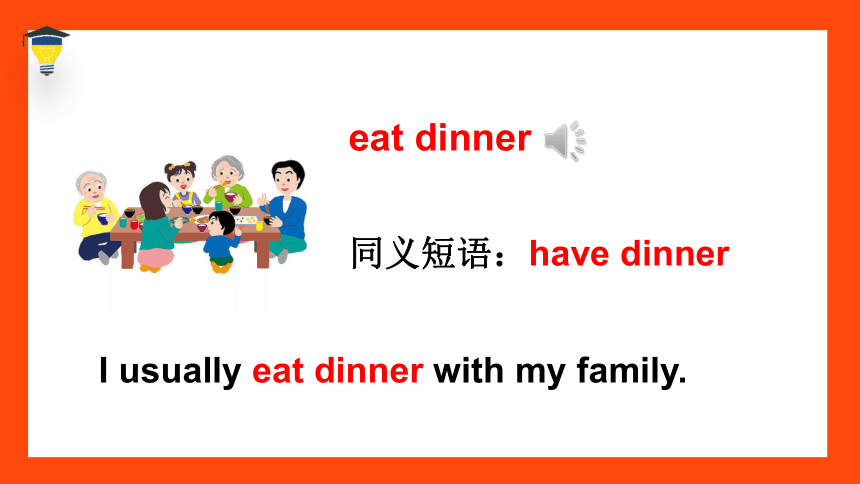
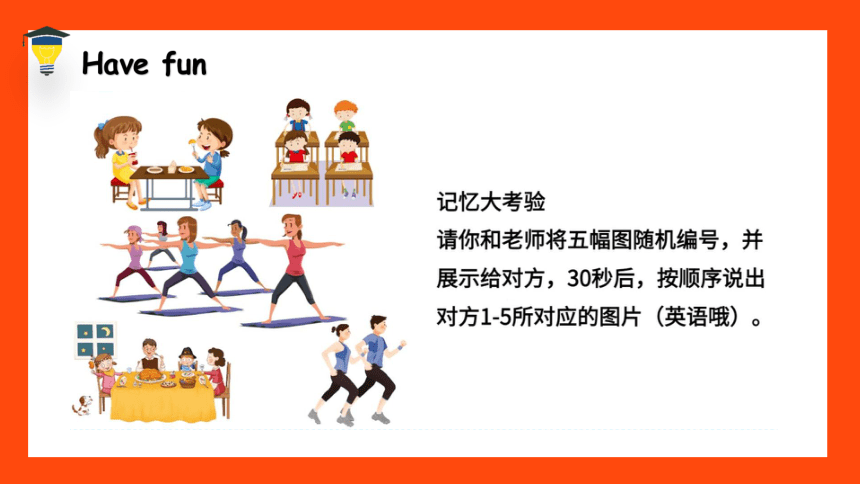


文档简介
(共77张PPT)
人教PEP版小学英语五年级下册
Unit 1 My Day
《目录》
1
新知讲解
2
知识延伸
《01》
新知讲解
Part A
Enjoy the music
do morning exercises
做早操
We do morning exercises every day.
have ... class
拓展:表示“上……课”常用
“have+课程名+class”
We have English class on Tuesdays.
eat breakfast
I often eat breakfast at 7 o'clock.
同义短语:have breakfast
拓展:eat lunch
eat dinner
同义短语:have dinner
I usually eat dinner with my family.
Have fun
play sports
have ... class
play sports
do morning exercises
eat breakfast
eat dinner
eat dinner
have ... class
Let's play
Let's try
Where are Zhang Peng and Pedro
Zhang Peng: When do you finish class in the morning
Pedro: We finish class at 1 o'clock. Then
we eat lunch at home.
Zhang Peng: Wow! When do you go back to school after lunch
Let’s talk
Pedro: At 2:30. Classes start at 3 o'clock.
Zhang Peng: When do you usually eat dinner in Spain
Zhang Peng: Wow! That's too late!
Pedro: Usually at 9:30 or 10 o'clock.
Let’s talk
ask and answer
①When does Pedro finish class in the morning
②When does he go back to school after lunch
③When does he usually eat dinner in Spain
At 1 o’clock.
At 2:30.
Usually at 9:30 or 10 o’clock.
Language points
—When do you (usually)+动词(短语)原形+(其它)
—I (usually) +动词(短语)原形+ at…
知识点1
课文原句:—When do you finish class in the morning
—We finish class at 1 o'clock.
怎样问答别人的作息情况
c
当此句型的主语是第三人称单数(he, she或单数名词)时,助动词do要变成does。
例句:—When dose Linda get up
—She gets up at 6:00.
知识拓展
询问时间还可用What time 来提问,what time常用来询问具体的时间点,可以与when进行交换。
6:30
7:00
7:20
10:40
12:00
2:15
3:00
4:50
9:00
get up
eat breakfast
go to school
have English class
eat lunch
have music class
have PE class
go home
go to bed
When do ...
I... at...
Role-play
0
25
20
0
15
10
5
开始
Non-stop talking
When do you...
I ...at...
视频讲解
Zhang Peng wants to know more
about Pedro's timetable.
When do you do morning exercises
Let's learn
When
什么时候
When do you eat breakfast/ dinner
I eat breakfast at 8:00 a.m.
eat breakfast
eat dinner
I eat dinner at 9:00 p.m.
Let's learn
When do you have an English class
At 9 o'clock.
Let's learn
When do you play sports
At 6 o'clock.
Let's learn
This is my timetable.
Let’s learn
7:00
a.m.
8:00
a.m.
9:00
a.m.
6:00
p.m.
9:00
p.m.
用法:a.m. / p.m. 是缩略式,因此我们读这两个
字母的字母音就可以了,它通常位于时刻的后面,且不与o’clock连用,相当于in the morning / in the afternoon。
Do you know
ask and write
Write down your partner's timetable.
get up
eat breakfast
eat lunch
eat dinner
do morning exercises
have ... class
play sports
go to bed
6:00 a.m.
Let’s learn
What does “cl” sound
cl-/kl/
cl
ea
n
clean
cl
cl
cl
er
e
a
o
v
ss
ck
clock
class
clever
Let's spell.
What does “pl” sound
pl-/pl/
pl
ay
play
egg
pl
pl
t
pl
ea
a
an
se
te
plate
please
eggplant
Let's spell.
字母 发音要领 例词
cl close
clock
pl plane
place
发音时, 舌后部隆起, 紧贴软腭, 形成阻碍, 然后突然放开, 让口腔内气流冲出, 爆破成音。发音时声带不振动。
双唇紧闭, 然后突然放开, 让气流从口腔冲出, 爆破成音。
Class, clock, plate,
eggplant, clean, play.
Bingo!
Bingo game
《01》
新知讲解
Part B
Let's try
Sarah has a busy weekend. Listen! Where is she
Shopkeeper: Why are you shopping today
Sarah: My mum worked last night. So I’m shopping
today.
Shopkeeper: Good girl ! So what do you do on the
weekend (on the weekend 在周末)
Sarah: I often watch TV and play ping-pong with my
father.
为什么(对原因提问)
昨天晚上
work(过去式)
看电视
打乒乓球
play+球类
和......一起
Shopkeeper: That sounds like a lot of fun.
Sarah: Yes , but I’m also hard-working. I usually wash
my clothes. Sometimes I cook dinner.
Shopkeeper : You’re so busy! You need a robot to help
you !
听起来
许多,大量
也
洗衣服
做晚饭
需要
询问对方正在做某事的原因
—Why are you shopping today
—My mum worked last night. So I’m shopping today.
—Why are you+doing...
—(Because)原因.
Why 意为“为什么”,回答一般用Because,也可省略。注意:because和so不能放在一个句子里。
某人过去做了某事的句型
My mum worked last night. 我妈妈昨天晚上工作了。
worked 是work 的过去式,描述过去发生的动作。
时态为一般过去时的句子中常有表示过去式的时间状语,
如:yesterday,last week,just now等。
so 的用法
So I’m shopping today.所以今天我购物。
You are so busy.你真忙/你如此忙!
so 表因果关系意为所以,表程度意为如此、那么
询问周末活动
—What do you do on the weekend
—I often watch TV and play ping-pong with my father.
句型结构:—What do you do on the weekend
—I/We+(频度副词)+动词原形+其它.
注意:当主语是第三人称单数(he/she或单数名词)时,助动词do要变为does。
Group work
Ask the question and then pass it on.
do homework
watch TV
have...class
play sports with
play music
wash my clothes
What do you do on the weekend
I often go shopping.
What do you do on the weekend
I usually clean my room.
Group work
I often ____________ on Saturdays.
clean my room
Let's learn
Let's learn
I usually ___________
on the weekend.
go for a walk
Sometimes, I __________ with my mum.
go shopping
Let's learn
I always __________________
on Sundays.
take a dancing class
Let's learn
go+v-ing
go swimming
go climbing
...
go boating
go fishing
go+动词-ing
Do a survey
Look,tick and write.
What do you do on the weekend
clean my room with...
on Saturdays
on Sundays
on the weekend
go shopping go for a walk take a dancing class I
always
often
sometimes
《01》
新知讲解
Part C
1. The story is about ____ day.
A. Zoom's B. Zip's
Watch and choose.
2. Today is ____.
A. Saturday B.Sunday
3. What will Zip do this weekend
A. Watch TV. B.Have a show.
Let's watch.
1. The story is about ____ day.
A. Zoom's B. Zip's
Watch and choose.
2. Today is ____.
A. Saturday B.Sunday
3. What will Zip do this weekend
A. Watch TV. B.Have a show.
Let's read.
Why
It's Saturday now. Zoom, I'm always very busy.
Let me see. From Monday to Wednesday, I usually collect nuts in the afternoon.
1. from... to ... 从……到……
2. collect nuts 收集坚果
On Thursday, I often dry my nuts in the sun.
1. What else 还有别的吗?
2. dry v. 弄干;变干
What else
On Friday, I eat nuts with my friends.
have a show 有一场演出
show n. 演出;歌舞表演
v. 出示;给……看
I often watch TV, but this weekend I have a show. I'll play the pipa.
What do you usually do on the weekend
When
Saturday, at 12 o'clock.
Oh, no!
Why is Zip in a hurry
Because it's 11:30 now.
Oh, no!
Why is Zip always very busy
1. from ______ to _________
collect nuts in the afternoon
2. on _______
dry her nuts in the sun
3. on _______
eat nuts with her friends
4. on the ________ —watch TV __________—have a show/ play the pipa
Thursday
Monday
Wednesday
Friday
weekend
this weekend
What does Zip do Monday
Tuesday Wednesday Thurday
Friday
weekend
this weekend
collect nuts
in the afternoon
dry nuts in the sun
eat nuts with friends
watch TV
have a show /play the pipa
Fill in the table.
《02》
拓展延伸
often是频度副词,
我们一起来认识一下五个常用频度副词吧!
频度副词
always 意为“总是”,发生频率为 100%
usually 意为“通常”,发生频率为 80%
often 意为“经常”,发生频率为 60%
sometimes 意为“有时”,发生频率为 40%
never 意为“从不”,发生频率为 0
practice
practice
practice
practice
总结:
Thank you!
人教PEP版小学英语五年级下册
Unit 1 My Day
《目录》
1
新知讲解
2
知识延伸
《01》
新知讲解
Part A
Enjoy the music
do morning exercises
做早操
We do morning exercises every day.
have ... class
拓展:表示“上……课”常用
“have+课程名+class”
We have English class on Tuesdays.
eat breakfast
I often eat breakfast at 7 o'clock.
同义短语:have breakfast
拓展:eat lunch
eat dinner
同义短语:have dinner
I usually eat dinner with my family.
Have fun
play sports
have ... class
play sports
do morning exercises
eat breakfast
eat dinner
eat dinner
have ... class
Let's play
Let's try
Where are Zhang Peng and Pedro
Zhang Peng: When do you finish class in the morning
Pedro: We finish class at 1 o'clock. Then
we eat lunch at home.
Zhang Peng: Wow! When do you go back to school after lunch
Let’s talk
Pedro: At 2:30. Classes start at 3 o'clock.
Zhang Peng: When do you usually eat dinner in Spain
Zhang Peng: Wow! That's too late!
Pedro: Usually at 9:30 or 10 o'clock.
Let’s talk
ask and answer
①When does Pedro finish class in the morning
②When does he go back to school after lunch
③When does he usually eat dinner in Spain
At 1 o’clock.
At 2:30.
Usually at 9:30 or 10 o’clock.
Language points
—When do you (usually)+动词(短语)原形+(其它)
—I (usually) +动词(短语)原形+ at…
知识点1
课文原句:—When do you finish class in the morning
—We finish class at 1 o'clock.
怎样问答别人的作息情况
c
当此句型的主语是第三人称单数(he, she或单数名词)时,助动词do要变成does。
例句:—When dose Linda get up
—She gets up at 6:00.
知识拓展
询问时间还可用What time 来提问,what time常用来询问具体的时间点,可以与when进行交换。
6:30
7:00
7:20
10:40
12:00
2:15
3:00
4:50
9:00
get up
eat breakfast
go to school
have English class
eat lunch
have music class
have PE class
go home
go to bed
When do ...
I... at...
Role-play
0
25
20
0
15
10
5
开始
Non-stop talking
When do you...
I ...at...
视频讲解
Zhang Peng wants to know more
about Pedro's timetable.
When do you do morning exercises
Let's learn
When
什么时候
When do you eat breakfast/ dinner
I eat breakfast at 8:00 a.m.
eat breakfast
eat dinner
I eat dinner at 9:00 p.m.
Let's learn
When do you have an English class
At 9 o'clock.
Let's learn
When do you play sports
At 6 o'clock.
Let's learn
This is my timetable.
Let’s learn
7:00
a.m.
8:00
a.m.
9:00
a.m.
6:00
p.m.
9:00
p.m.
用法:a.m. / p.m. 是缩略式,因此我们读这两个
字母的字母音就可以了,它通常位于时刻的后面,且不与o’clock连用,相当于in the morning / in the afternoon。
Do you know
ask and write
Write down your partner's timetable.
get up
eat breakfast
eat lunch
eat dinner
do morning exercises
have ... class
play sports
go to bed
6:00 a.m.
Let’s learn
What does “cl” sound
cl-/kl/
cl
ea
n
clean
cl
cl
cl
er
e
a
o
v
ss
ck
clock
class
clever
Let's spell.
What does “pl” sound
pl-/pl/
pl
ay
play
egg
pl
pl
t
pl
ea
a
an
se
te
plate
please
eggplant
Let's spell.
字母 发音要领 例词
cl close
clock
pl plane
place
发音时, 舌后部隆起, 紧贴软腭, 形成阻碍, 然后突然放开, 让口腔内气流冲出, 爆破成音。发音时声带不振动。
双唇紧闭, 然后突然放开, 让气流从口腔冲出, 爆破成音。
Class, clock, plate,
eggplant, clean, play.
Bingo!
Bingo game
《01》
新知讲解
Part B
Let's try
Sarah has a busy weekend. Listen! Where is she
Shopkeeper: Why are you shopping today
Sarah: My mum worked last night. So I’m shopping
today.
Shopkeeper: Good girl ! So what do you do on the
weekend (on the weekend 在周末)
Sarah: I often watch TV and play ping-pong with my
father.
为什么(对原因提问)
昨天晚上
work(过去式)
看电视
打乒乓球
play+球类
和......一起
Shopkeeper: That sounds like a lot of fun.
Sarah: Yes , but I’m also hard-working. I usually wash
my clothes. Sometimes I cook dinner.
Shopkeeper : You’re so busy! You need a robot to help
you !
听起来
许多,大量
也
洗衣服
做晚饭
需要
询问对方正在做某事的原因
—Why are you shopping today
—My mum worked last night. So I’m shopping today.
—Why are you+doing...
—(Because)原因.
Why 意为“为什么”,回答一般用Because,也可省略。注意:because和so不能放在一个句子里。
某人过去做了某事的句型
My mum worked last night. 我妈妈昨天晚上工作了。
worked 是work 的过去式,描述过去发生的动作。
时态为一般过去时的句子中常有表示过去式的时间状语,
如:yesterday,last week,just now等。
so 的用法
So I’m shopping today.所以今天我购物。
You are so busy.你真忙/你如此忙!
so 表因果关系意为所以,表程度意为如此、那么
询问周末活动
—What do you do on the weekend
—I often watch TV and play ping-pong with my father.
句型结构:—What do you do on the weekend
—I/We+(频度副词)+动词原形+其它.
注意:当主语是第三人称单数(he/she或单数名词)时,助动词do要变为does。
Group work
Ask the question and then pass it on.
do homework
watch TV
have...class
play sports with
play music
wash my clothes
What do you do on the weekend
I often go shopping.
What do you do on the weekend
I usually clean my room.
Group work
I often ____________ on Saturdays.
clean my room
Let's learn
Let's learn
I usually ___________
on the weekend.
go for a walk
Sometimes, I __________ with my mum.
go shopping
Let's learn
I always __________________
on Sundays.
take a dancing class
Let's learn
go+v-ing
go swimming
go climbing
...
go boating
go fishing
go+动词-ing
Do a survey
Look,tick and write.
What do you do on the weekend
clean my room with...
on Saturdays
on Sundays
on the weekend
go shopping go for a walk take a dancing class I
always
often
sometimes
《01》
新知讲解
Part C
1. The story is about ____ day.
A. Zoom's B. Zip's
Watch and choose.
2. Today is ____.
A. Saturday B.Sunday
3. What will Zip do this weekend
A. Watch TV. B.Have a show.
Let's watch.
1. The story is about ____ day.
A. Zoom's B. Zip's
Watch and choose.
2. Today is ____.
A. Saturday B.Sunday
3. What will Zip do this weekend
A. Watch TV. B.Have a show.
Let's read.
Why
It's Saturday now. Zoom, I'm always very busy.
Let me see. From Monday to Wednesday, I usually collect nuts in the afternoon.
1. from... to ... 从……到……
2. collect nuts 收集坚果
On Thursday, I often dry my nuts in the sun.
1. What else 还有别的吗?
2. dry v. 弄干;变干
What else
On Friday, I eat nuts with my friends.
have a show 有一场演出
show n. 演出;歌舞表演
v. 出示;给……看
I often watch TV, but this weekend I have a show. I'll play the pipa.
What do you usually do on the weekend
When
Saturday, at 12 o'clock.
Oh, no!
Why is Zip in a hurry
Because it's 11:30 now.
Oh, no!
Why is Zip always very busy
1. from ______ to _________
collect nuts in the afternoon
2. on _______
dry her nuts in the sun
3. on _______
eat nuts with her friends
4. on the ________ —watch TV __________—have a show/ play the pipa
Thursday
Monday
Wednesday
Friday
weekend
this weekend
What does Zip do Monday
Tuesday Wednesday Thurday
Friday
weekend
this weekend
collect nuts
in the afternoon
dry nuts in the sun
eat nuts with friends
watch TV
have a show /play the pipa
Fill in the table.
《02》
拓展延伸
often是频度副词,
我们一起来认识一下五个常用频度副词吧!
频度副词
always 意为“总是”,发生频率为 100%
usually 意为“通常”,发生频率为 80%
often 意为“经常”,发生频率为 60%
sometimes 意为“有时”,发生频率为 40%
never 意为“从不”,发生频率为 0
practice
practice
practice
practice
总结:
Thank you!
